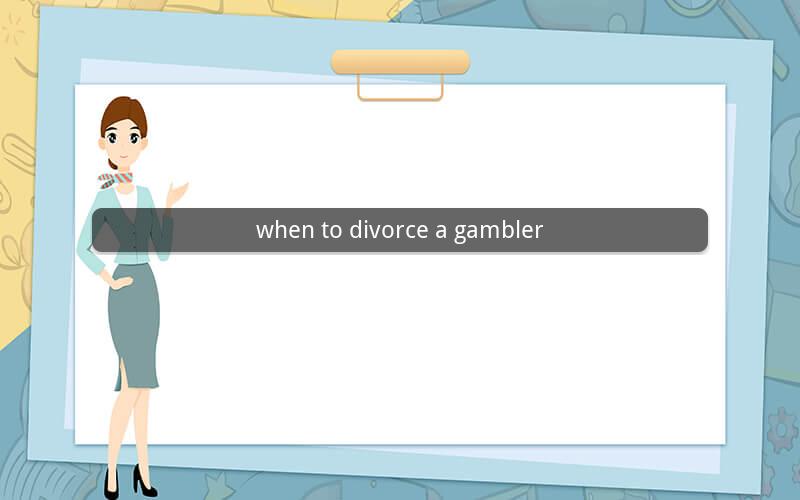
Table of Contents
1. Understanding Gamblers
2. Identifying the Signs of Problem Gambling
3. The Emotional Impact on a Relationship
4. The Financial Consequences of Gambling
5. Communication Strategies
6. Seeking Professional Help
7. Legal Considerations
8. Support for Both Parties
9. The Role of Therapy
10. Preparing for the Divorce Process
1. Understanding Gamblers
When considering divorce due to gambling, it is crucial to understand the nature of gambling addiction. Gamblers often have a strong desire to win back money lost or to recoup financial losses. This can lead to increased debts, strained relationships, and a disregard for the well-being of their family.
2. Identifying the Signs of Problem Gambling
To determine if your partner's gambling has reached a problematic level, look for the following signs:
- Secretive behavior, such as lying about gambling activities or hiding gambling paraphernalia.
- Unexplained financial problems, such as missing money or unpaid bills.
- Increased time spent gambling, either online or at casinos.
- Withdrawal from family and friends, and neglect of responsibilities.
- Mood swings, anxiety, and depression related to gambling.
3. The Emotional Impact on a Relationship
Problem gambling can take a significant toll on a relationship. It can lead to feelings of anger, betrayal, and despair. Both partners may experience emotional stress, anxiety, and depression. It is essential to recognize the emotional impact of gambling addiction on your relationship and seek support to cope with these emotions.
4. The Financial Consequences of Gambling
Gambling addiction can have severe financial consequences. It can lead to massive debts, loss of assets, and potential bankruptcy. Financial stress can exacerbate the problems in your relationship and make it challenging to stay together.
5. Communication Strategies
Effective communication is key to addressing the issue of problem gambling. Here are some strategies to consider:
- Approach the subject calmly and without judgment.
- Express your concerns clearly and honestly.
- Avoid confrontational language and listen to your partner's perspective.
- Focus on the problem, not the person.
- Consider seeking a professional mediator to facilitate communication.
6. Seeking Professional Help
Seeking professional help is an important step in dealing with a gambling addiction. A therapist or counselor can provide guidance on how to cope with the addiction and help both parties work through the emotional turmoil. Here are some options for professional help:
- Gamblers Anonymous (GA): A support group for individuals struggling with gambling addiction.
- Professional therapists specializing in addiction treatment.
- Family therapists to address the emotional impact on the relationship.
7. Legal Considerations
In some cases, problem gambling may lead to legal issues, such as fraud or theft. It is essential to consult with a lawyer to understand the potential legal consequences and explore options for resolution.
8. Support for Both Parties
Both parties in the relationship need support during this challenging time. Consider the following support options:
- Support groups for partners of gamblers.
- Individual therapy for emotional healing.
- Counseling for couples to address the issues in the relationship.
9. The Role of Therapy
Therapy can play a crucial role in healing the relationship and addressing the underlying issues. Here are some benefits of therapy:
- Emotional support and guidance.
- Learning effective coping strategies.
- Developing healthier communication skills.
- Addressing the root causes of the problem.
10. Preparing for the Divorce Process
If divorce becomes inevitable, it is essential to prepare for the process. Consider the following steps:
- Gather all necessary documents, such as financial records and legal agreements.
- Consult with a lawyer to understand the legal aspects of divorce.
- Develop a plan for the future, including financial stability and custody arrangements.
- Seek support from friends, family, and professionals to cope with the emotional challenges.
FAQs
1. How can I tell if my partner's gambling is a problem?
- Look for signs such as secrecy, financial problems, increased gambling time, and emotional turmoil.
2. What should I do if I suspect my partner is a problem gambler?
- Approach the subject calmly, express your concerns, and seek professional help.
3. Can gambling addiction be cured?
- While there is no guaranteed cure, many individuals can recover with the right support and treatment.
4. How can I support my partner during their recovery process?
- Offer your love and support, encourage them to seek professional help, and be patient throughout their journey.
5. Can therapy help my relationship if my partner is a problem gambler?
- Yes, therapy can help both parties work through the emotional issues and improve communication.
6. What are the legal consequences of gambling addiction?
- Legal consequences may vary depending on the severity of the addiction and the actions taken by the individual.
7. How can I deal with the financial consequences of gambling addiction?
- Consider seeking financial counseling, exploring debt consolidation options, and prioritizing essential expenses.
8. Can a relationship survive a gambling addiction?
- While it is possible, it may require significant work, support, and healing for both parties.
9. What is the role of a family therapist in dealing with a gambling addiction?
- A family therapist can help address the emotional impact on the family, improve communication, and provide guidance on how to cope with the addiction.
10. How can I prepare for the divorce process if my partner is a problem gambler?
- Gather all necessary documents, consult with a lawyer, seek support, and develop a plan for the future.